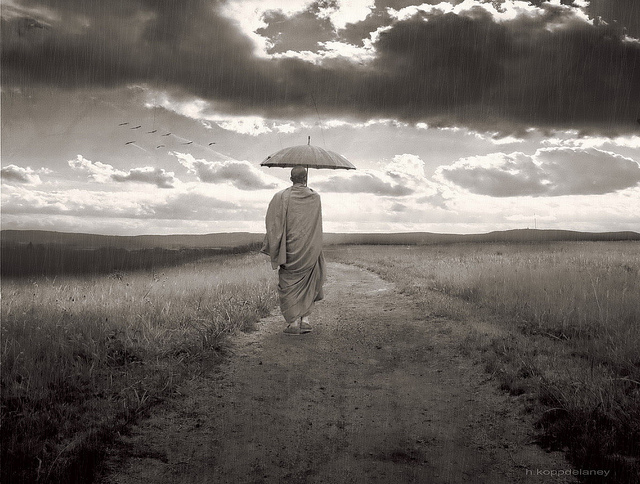Suzuki Shosan, the samurai who became a zen monk in the 1600s in Japan, said that there were five points in Buddhist practice.
He listed five reasons why we should engage in the Dharma. I think these five points are relevant for us today.
Shosan’s Five Points for Buddhist Practice:
1) Usefulness in society
2) Upholding the precepts
3) Separating the self from personal views and experiencing oneness.
4) Freeing the mind from attachment to objects
5) Destruction of evil passions.
I’ll examine these one at a time.
Usefulness in society
Conquering your delusions and transforming yourself helps everyone. If we demonstrate that delusions can be overcome then we are setting an example for others. Not only that, but as we strengthen our compassion, we are helping others and trying to build a more compassionate society.
Upholding the Precepts
The precepts help us control any tendency to twist and distort the teachings. The mind naturally becomes virtuous through Buddhist practice if we follow the precepts and try to live a morally upstanding life.
Separating the self from personal views and experiencing oneness.
That seems like a short sentence, but there’s a lot of meaning in it. What is separating ourselves from personal views? Personal views are the labels we put on the world and especially on ourselves.
As soon as I label myself as a certain political party, for example, I’m putting myself into a rigid paradigm that doesn’t reflect reality. That’s why people get so attached to such things and they let their common sense go. It often happens that a relationship ends and someone thinks, “What am I if I’m not a boyfriend/girlfriend/wife/husband?” because we create labels and then we attach to them. Whatever small views we have are minor when compared to the actual reality of things. Our whole perception consists of labeling things and putting them into categories because that’s how our brains our wired.
It serves us well in some ways, but in other ways it harms us.
What is oneness? Oneness is a direct perception of reality without being distracted by all the delusions and labels that we put on it. A feeling of oneness is an intuitive understanding that we aren’t separate from our environment and the other beings around us. Our true nature is one with everything and we can have experiences in which we feel that oneness. To be one with everything is to love everything and to feel loved in return.
Free mind from attachment to objects
This leads the mind to more selflessness and less greed. How often do the things we own seem to own us? If my computer broke I would be devastated. But why? It’s an object. Not only is it replaceable, but also most of its functions can be performed on my phone anyway.
We become so attached to objects that we let them consume us. Some people hoard possessions, collecting all they can, doing whatever they have to to get more. We call this the poison of greed. Greed hurts people. It causes mistrust and jealousy and anger. I think it’s true what they say, “The best things in life aren’t things.”
I get more joy from going for a walk on a warm summer morning than from owning the newest cool gadget. We live in a consumer driven society. Everything I hear and see tells me we should own more to be happy. The things you own end up owning you. If we determine our self worth by how much we own, it will never ever be enough.
Destruction of Evil Passions
The evil passions Shosan is talking about are those negative emotions like greed, lust, jealousy and excessive pride. As we walk the path of Buddhist practice, these passions soften and are overcome. These evil passions have a huge impact on our ability to be compassionate to others. It’s harder to love someone when we are busy being jealous, wishing we had what they have.
These kinds of feelings are fine in small amounts and we shouldn’t be hard on ourselves for feeling them, but they don’t serve us well and we need to understand that. Many relationships and friendships are ruined by greed and jealousy. One of the major benefits of Buddhist practice is that these feelings start to soften.
I really like Shosan’s Five Points. He was a down to earth Zen teacher who explained things in ways that were easy to understand.
What do you think?
Love elephant and want to go steady?
Sign up for our (curated) daily and weekly newsletters!
Editor: Catherine Monkman
Photo: Hartwig HKD/Flickr


 Share on bsky
Share on bsky





Read 0 comments and reply